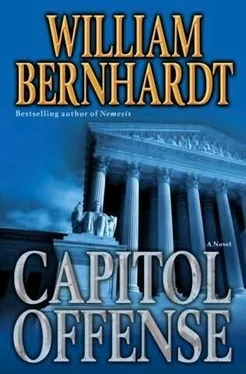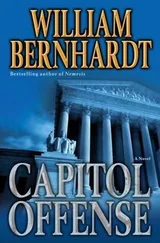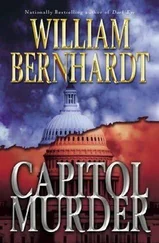“One final matter I would like to touch upon before I yield to my worthy colleague,” Guillerman said. “There will undoubtedly be testimony on both sides regarding the defendant’s mental state. That is sadly inevitable when a person has been through the undoubtedly traumatic experience of losing a spouse. It is all too easy to get lost in the hugger-mugger of psychiatric jargon. I will not tell you what to think. But I will suggest that you listen to the evidence and decide for yourself. Don’t be swayed by long words or impressive credentials. You’re Oklahomans. You’re as smart as anyone and, more to the point, you’re the jurors. Don’t be confused by a smokescreen of babble. Use your heads.”
He stepped closer to the jurors and looked at them with an expression that Ben noted was, among other things, extremely sincere. “Dennis Thomas bought a gun. He found out where Detective Sentz was. He went there. He pulled the trigger. These systematic, calculated actions were not accidental, and they were not the product of an unbalanced mind. They evidence planning, deliberation, and stone-cold execution. What more is there to say? Don’t let yourselves be misled. See the truth for what it is. This was murder in the first degree, deserving the ultimate sanction. And that is exactly what I will be asking for at the conclusion of this case. Thank you.”
With that he sat down, never once having used the phrase “temporary insanity,” but effectively dismissing it just the same.
And perhaps in that instant Ben realized just how impossible this case really was.
As always, Ben had the option of delivering his opening statement immediately, or waiting until the prosecution’s case had closed and giving it at the start of the defense’s case. And as always, he chose to do it now. He never liked to let the jury go too long without hearing from him, especially after such an effective opening. He knew he had to get their side of the story in the jury’s heads immediately, to let them know what the points of contention were, so they could be thinking about them while the prosecutor presented his case. They could say anything they wanted; the smart jurors would always remember what points were in doubt. And for the defense, doubt was what it was all about.
“The prosecutor has done an admirable job of summing up some of the facts of the case,” Ben began, doing his best to seem agreeable and not argumentative. “There are, however, a few things he got wrong and, more important, many things he left out. And that, ladies and gentlemen, is where the entire case lies.
“Mr. Guillerman would have you believe he has an airtight case, but that is far from the truth. Consider, if you will, everything he told you the prosecution would be presenting at trial. Dennis Thomas believed Detective Sentz was responsible for the horrible death of his wife. That much is true. As the evidence will show, she suffered the most unimaginable agony, unbelievable pain, for seven days. Seven days . The police had the ability to locate her in a few hours. Imagine how that would make any loving husband feel. After you hear what happened, you may well think the police are ultimately responsible for her death, too.
“It is also true that Dennis sought Detective Sentz out. Wanted to confront him, to talk to him, to get some explanations. Who would not want to confront the man you thought killed your wife? I don’t doubt that there are many people who saw Dennis at the hotel. He made no attempt to hide it-and that in itself is telling.
“But that’s where the prosecution case falls apart. Because once Dennis was inside that hotel room, they have no idea what happened. Do they have any eyewitnesses to this alleged crime? No. Do they have any proof Dennis fired the gun? No. They seem to think that if they can just put Dennis in the room, that will be enough. But it isn’t. They have to prove his guilt beyond a reasonable doubt. And that means, at the very least, two things: the prosecution has to prove that he pulled the trigger, and you have to believe he was not insane at the time.”
Out the corner of his eye, Ben saw Guillerman twitch. He was undoubtedly tempted to object, but he didn’t, probably because he knew jurors didn’t like objections during opening and closing and he didn’t want to irritate them this early in the game. Ben had chosen his words carefully. He hadn’t actually said that the prosecution had to prove Dennis was sane when he shot Sentz, because temporary insanity was their affirmative defense and the burden of proving it was on them. At the same time, Ben had put a critical idea into their heads: they didn’t have to find Dennis guilty even if they thought he pulled the trigger.
Ben strolled back to his table as he began the next section of his opening. Dennis looked good, respectable, honorable. Ben wanted the jury looking at him while he talked about him. “There is one important detail the evidence will reveal that you have not yet been told. The district attorney does not dispute it, but still, oddly enough, he failed to mention it. When the police found Dennis in that hotel room, he was unconscious. In fact, he did not regain consciousness for over two hours. Why? The prosecution has no explanation. Did someone hit him over the head before shooting Detective Sentz? It’s possible. Did Dennis experience some kind of mental breakdown? Possible. The evidence will show that Dennis experienced extreme trauma after losing his wife in such a horrific way, trauma that would have driven the best of us to unimaginable extremes. Trauma that prevented him from understanding what he was doing, that literally unraveled his fundamental understanding of what is right and what is wrong.”
Ben casually moved from one end of the jury box to the other, never for a moment relinquishing his hold on the eyes of the jurors.
“I know that some of you may be dubious, perhaps even cynical about the science of psychiatry, or the idea of temporary insanity. It’s understandable. We’re Oklahomans. Good, honest, commonsense people. All I ask is that you listen to the testimony presented and view it with an open mind. Try to imagine for a moment what this man was going through, what his wife had gone through, and how that would have affected him. What that must have done to his powers of reason. To his sanity. The defense will show that, regardless of what took place that day, the circumstances rendered Dennis temporarily insane, and under the law, a man who is temporarily insane cannot be held accountable for his actions. And then ask yourself-what if it had been you? What if it had been your spouse? Wouldn’t you have reacted the same? Wouldn’t anyone?
“And most important…” Ben leaned against the rail, getting as close to them as possible. “Most important, I ask that you remember the oath you took when you were sworn into your current position. You swore to uphold the law. The law says that you must presume that Dennis Thomas is innocent. You must presume his innocence and continue presuming it unless and until the prosecution proves otherwise-beyond a reasonable doubt. That’s what matters most. That is the single most important part of your duty.”
He took a few steps back, making sure they could see District Attorney Guillerman. “No amount of political ambition is a substitute for the truth. No desire to win a highly publicized trial is a substitute for the evidence. If the prosecution does not prove their case, regardless of what you think, you must find Dennis not guilty. That is the oath you swore. And I’m counting on you to abide by it.”
Ben slowly walked back to his seat. Just under the table, he could see Christina giving him a subtle thumbs-up. That was a good sign. But he didn’t fool himself. This was a tough case. And he had no way of knowing whether he was getting across to them until they rendered their verdict. When it would be too late for him to do anything about it.
Читать дальше








